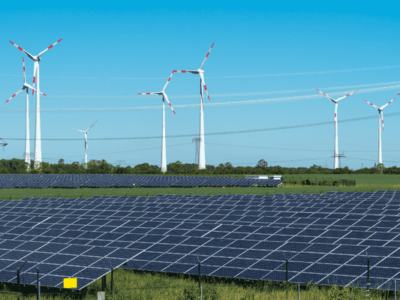Commercial activity in fossil fuels is increasingly at odds with global actions to reduce the threat of climate change. Burning coal, oil, and natural gas is responsible for two-thirds of humanity’s emissions of greenhouse gases, and yet provides more than 20% of GDP in two dozen nation states.
By Citicorp’s estimate, current commitments to reduce these emissions could mean forgoing $100 trillion in fossil fuel revenues by 2050 — representing a huge disruption to global affairs, undermining national budgets and corporate balance sheets while exposing stakeholders, including pension holders and ordinary citizens in resource-exporting states, to myriad risks.
Two seminal articles by energy experts in the latest issue of MRS Energy and Sustainability (MRS E&S) examine the climate-related risks facing the fossil fuel industry and conclude that the sustainability train has already well and truly left the station — and is not coming back.
An in-depth analysis by Jim Krane (Wallace S. Wilson Fellow for Energy Studies at Rice University in Houston) is very timely in the light of last month’s announcement from Exxon Mobil that it will invest $20 billion through 2022 to expand its chemical and oil refining plants on the US Gulf Coast.
The former Associated Press Gulf correspondent finds, however, that climate changes risks vary according to different sectors of the energy industry. Demand for oil seems to be insulated from the very immediate risks facing other sectors of the industry, due to its unique role in transportation and the lack of viable alternatives, he writes. Citing a study by McGlade and Ekins, he concludes that oil reserves are the least exposed of the three fuels. Just a third of current conventional crude oil reserves would probably be abandoned to meet current global climate change targets, as opposed to half of gas and 82% of coal reserves.
For coal, the threats posed by climate action are already being felt. Coal firms have lost a combined 31,000 jobs and $30 billion in share value since 2010 in the US alone, according to Krane. Coal’s fortunes now rest with developing countries, where decisions to seek China-style, coal-led development will be met by increasing international pressure to choose an alternate path, Krane writes.
At the other end of the spectrum, climate action seems to have improved the medium-term viability of low-carbon natural gas, given the fuel’s reduced carbon content, according to Krane. Many anticarbon policies that target coal cede market share to gas, he writes. Longer term, however, gas is vulnerable to replacement by lower-carbon substitutes.
Krane predicts that some businesses, and perhaps even some governments, may not survive the increasing pressures facing the energy industry as a result of climate change actions.
“Unless a technological breakthrough can restrict carbon releases, the fortunes of the fossil fuel industry and the stability of Earth’s climate will be locked in a zero-sum game,” he concludes. “Climate’s gain is the industry’s loss and vice versa.”
“It is clear that carbon-based businesses and economies face increasing impediments to the consumption of their products,” he writes. “Whether through taxes, legal restrictions, moral arguments, favoritism for competitors, or hampered access to financial markets, the industry faces a future that is less accepting of current practice.”
In his commentary on Krane’s article in the same volume of MRS E&S , Ritchie D. Priddy, a seasoned energy industry veteran who has published more than 200 papers on clean energy and sustainability issues, agrees with the majority of Krane’s thesis. He argues that what he calls the “sustainability movement” has already had a substantial impact on the practices of energy companies and governments and will continue to grow, in spite of the outcry over some countries backpedaling from the Paris Accord.
The sustainability train has already left the station, he writes, and although the pace may slow, sustainability actions will continue around the world regardless of which governments are in place in the US and elsewhere. The main driver for action is peer pressure, he adds, rather than any government action.
“As [sustainability efforts] become more ingrained in the daily operations of all companies — primarily through peer pressure — they will, collectively, become more powerful than any international treaty, and something that cannot easily be removed,” Priddy concludes.
Reference(s):
1. Publication:
– Jim Krane. Climate change and fossil fuel: An examination of risks for the energy industry and producer states. MRS Energy & Sustainability, 2017
– Ritchie D. Priddy. Sustainability: The train has left the station. MRS Energy & Sustainability, 2017
2. Research story: Cambridge University Press | April 18, 2017 (source)














Comments